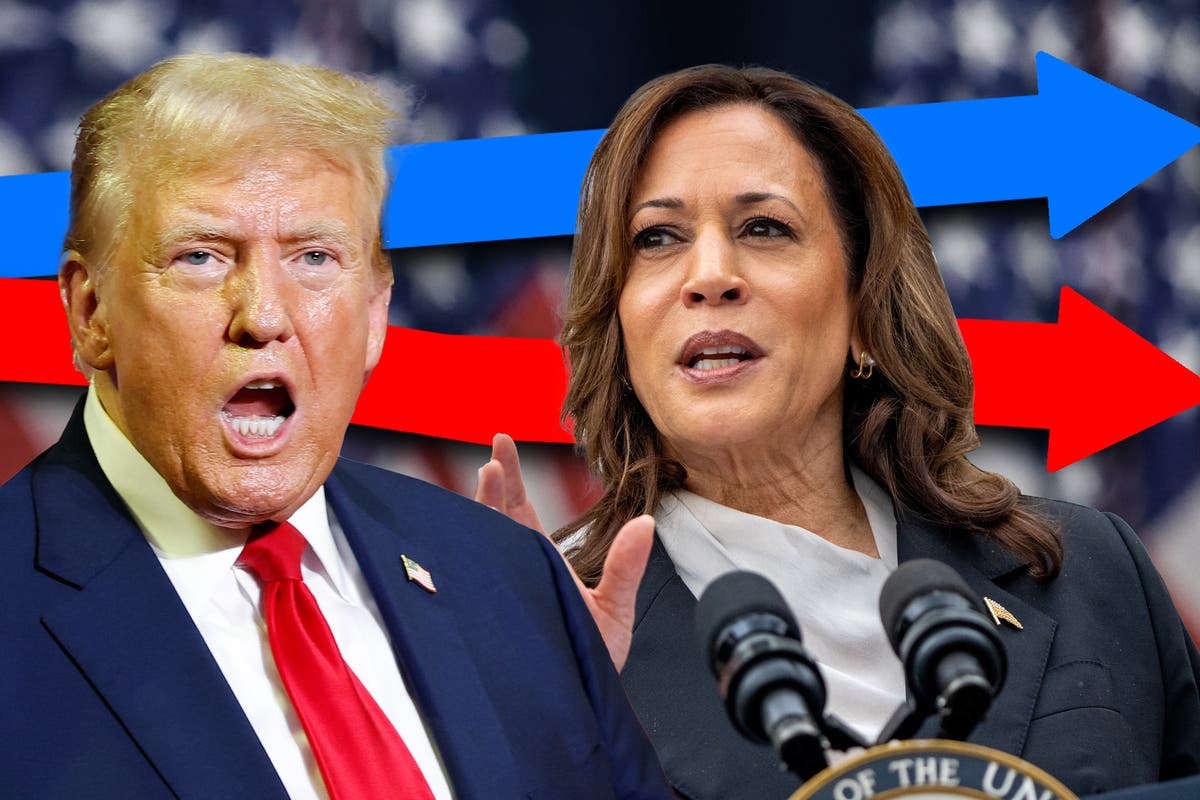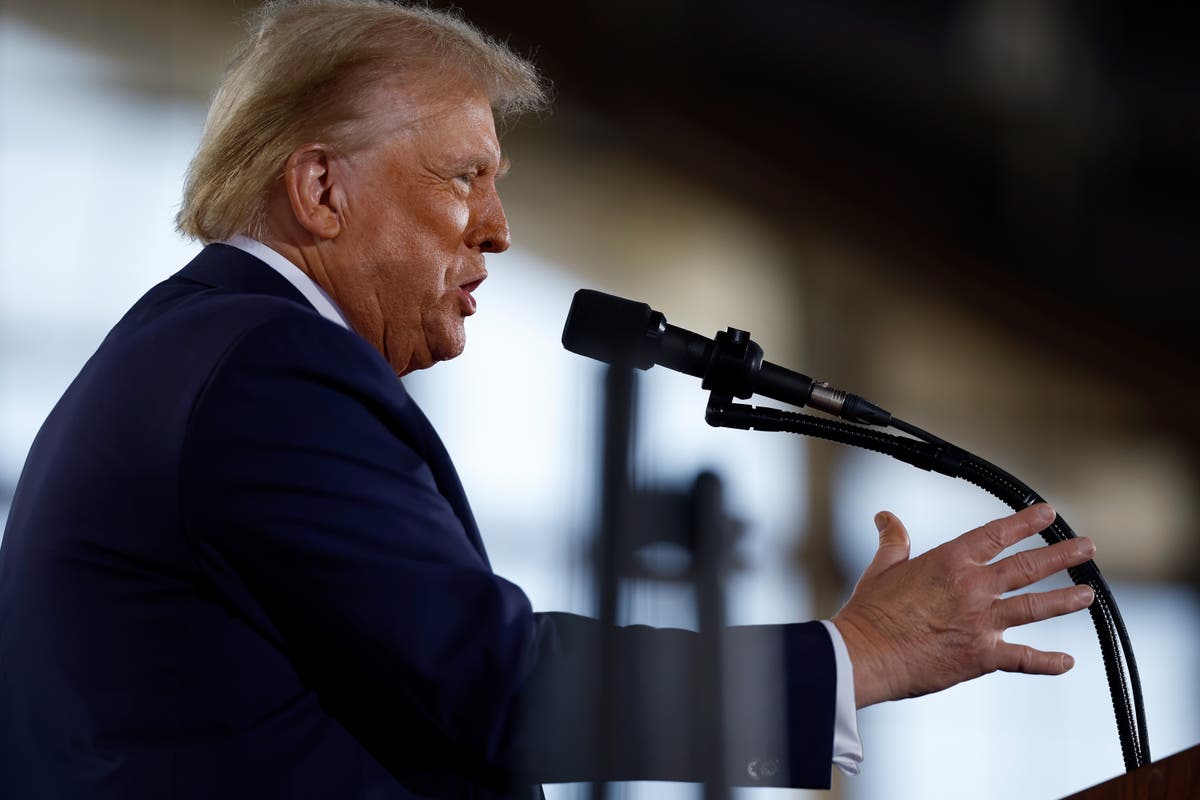World
Can Kamala Harris beat Donald Trump? Latest poll updates from the 2024 election

Vice President Kamala Harris is making a bid for the White House with running mate Tim Walz after replacing President Joe Biden on the Democratic ticket months before Election Day.
Fresh polls suggest that the Harris-Trump gender divide is growing, and the rural-urban-suburban split is staying strong.
As Donald Trump pivots his attention from New Hampshire to Pennsylvania, Biden and Harris rallied together in Pittsburgh on Monday.
So how will Harris actually fare against Trump in November?
While independent candidate Robert F Kennedy Jr suspended his presidential campaign in August and endorsed Trump, there has been no clear ripple effect as of yet, with neither candidate receiving a substantial boost in support.
Harris has a 3.1-point lead over Trump in the latest average of national polls, collated by FiveThirtyEight. On average, Harris has been marginally ahead of Trump in national polls, though the race remains tight with variation in swing states.
However, a new poll up to September 2 by Activote has Harris’s lead at just 1.6 percent, following weeks of a 5-point lead.
The poll of 1,000 likely voters is self-selected, as respondents choose to download the app and contribute.
While Trump is taking home rural voters, at 63 percent, Harris leads among both urban-resident (58 percent) and suburban voters (56 percent).
Suburban voters chose Trump over Hilary Clinton in 2016, while in 2020, Biden flipped the lead for Democrats.
Another ABC News/Ipsos poll up to August 27 shows that the American public thinks that Harris is doing a better job on her campaign overall, while Trump is in the red.
The poll also suggests that a third of Trump supporters (31 percent) have reservations about their choice.
This is nearly double the amount of people who support Harris with reservations (18 percent).
It seems Harris has inspired more devotion from Democrat supporters, as the same poll in July found that 34 percent of Biden supporters had reservations about his candidacy.
In July, just 34 percent of Biden voters strongly supported his candidacy, compared to 60 percent who now strongly support Harris.
However, one in five Harris voters are acting mainly out of dislike for other candidates; while just 9 percent of Trump supporters feel the same.
While the DNC from August 19 to 22 made little dent in the overall Harris-Trump split, the gender divide between the two candidates’ support continued to grow.
The number of women supporting Harris increased by +3 points from pre-convention numbers, to 54 percent, while just 41 percent of women surveyed support Trump.
However, Trump also received a boost of +5 points among men in this period; with 51 percent of men supporting the Republican candidate.
The poll also shows that Kennedy’s exit makes no difference to the vast majority (79 percent) of voters, and there has been no impact on Trump-Harris numbers.
It may take some time for the changes to reflect in the polls. This analysis from The Independent shows how RFK Jr. has higher support in states like New Mexico, and could free up some of the younger vote.
Demographics
The Activote September 2 poll shows that Trump’s key supporters remain male voters, the 65+, and white voters with no college education.
However, Harris and Trump are tied in the 50-64 age group in this poll, which previously leaned Trump.
Harris polls best with young voters, female voters, and Black voters, among whom Harris has a +52 point lead.
Meanwhile, Trump has a +6 point lead with Latino voters.
Independents
A Morning Consult megapoll of 11,501 registered voters shows that independent voters are also leaning more towards Harris, though there has been significant variation between different surveys of the elusive voter group.
Capturing the independent vote will be crucial for either Harris or Trump to take the lead in this election. This was the most likely group to vote for Kennedy, with 1 in 10 independents saying they will vote for a third-party candidate.
Meanwhile, exclusive polling from Savanta showed that voters still trust the Republican Party more to handle major policy issues like the economy, inflation, jobs, and crime.
Fighting in the battlegrounds
In the seven battleground states — Arizona, Georgia, Michigan, Nevada, North Carolina, Pennsylvania and Wisconsin — the fight is still being waged between Democrat and Republican campaigns.
A CNN poll released September 4 found that Harris leads Trump in four battlegrounds states: Wisconsin, Michigan, Georgia and Nevada. Trump leads in Arizona, while the two are tied in Pennsylvania.
Meanwhile, research from the Cook Political Report show that Harris has a lead in six out of seven states, with Trump holding strong in Nevada.
The poll shows Harris’s strongest lead in Arizona, where Biden won by just 0.4 percent in 2020.
This is a substantial swing from the same polls in May, with a Trump-Biden matchup, where Trump led in six states and tied in Wisconsin.
Yet polling in swing states continues to show variation from pollster to pollster, with a YouGov/CBS poll conducted up to the same date (August 2) suggesting that neither candidate had a significant lead in any of the battlegrounds.
Overall, battleground polls have consistently shown that Harris has picked up momentum from her predecessor’s trailing support, and is on-track to lead Trump in some states.
What do voters think?
A poll from Emerson College (August 12-14) shows that Kamala Harris is the only candidate of whom voters have an overall favorable opinion, at +2 percent.
This is significantly more positive than both Trump and his running mate Vance, who have a net -10 unfavorable rating, according to the poll of 1,000 US likely voters.
For live updates on the US presidential election, click here.
Meanwhile, VP pick Walz has an overall neutral favorability rating, with 39 percent of voters holding a favorable view and 39 percent holding an unfavorable view.
Interestingly, one in five voters (22 percent) said they had never heard of Walz, one week after he was selected. For JD Vance the number was lower, at 12 percent.
When asked how much they approve of how incumbent Joe Biden is doing as president, voters showed net disapproval of -14 percent.










